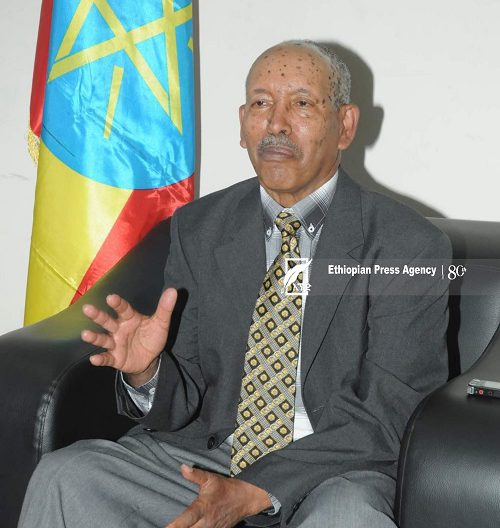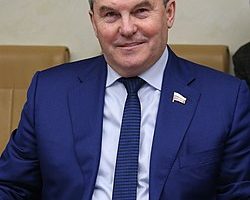
BY STAFF REPOTER
Professor Admasu Gebeyehu is one of the leading water engineers in Ethiopia. He received a Bachelor’s degree in Civil Engineering from Addis Ababa University in 1972 and a Master’s Degree in Hydrology from the National University of Ireland in 1976. He received his doctorate in 1981 from the Royal Institute of Water Technology (Stockholm, Sweden).
He has worked as the Dean of Arba Minch Water Technology, and has taught at Addis Ababa University.
In Ethiopia, he has participated in river flow, irrigation and drinking water studies, hydroelectric studies and similar issues as an expert and team leader. He has been a member and executive member of the Ethiopian Human Rights Council (EHRC) for seven years.
He played a key role in Ethiopian politics during his five-year term as chairman of EDP-Medhin, in the 2005 general election.
In 2018, he published a book entitled “Consensus Democracy” based on human rights, the rule of law, the process of building democracy and related issues. Following is an excerpt from our interview with Professor Admasu.
Why do you think are foreign powers meddling in the internal affairs of Ethiopia and violating its sovereignty? What do you think could be done to counter it?
In my opinion, the problem is with us. We have made ourselves dependents on others instead of becoming self-reliant. It is not surprising, therefore, that those who claim to support us often view us inferior to them. They want everything we do to be tailored to their needs. We say, “We are temporarily in trouble.” We are not willing to be humiliated.” It is because of their pride and arrogance that we are dependent on them.
We can eliminate this once and for all. In any case, we do not have the natural limitations of living in poverty. We have potential in all areas of life, and we can come out of this humiliation in the face of strangers. Nothing will stop us. Our people are hardworking and strong people, and our country is rich and blessed for the survival of its people. But that idea did not come true.
For this reason, the TPLF government, which is expected to take responsibility and lead the country, will not be able to function properly, save the people from poverty, and save us from evil. While on power TPLF plundered and misappropriated wealth. It was then ousted from power by the peoples resistance. His job was to serve the people instead of serving the people.
The TPLF’s atrocities against the Ethiopian people are obvious, but some foreign powers are turning a blind eye to them. I believe these blind supporters of the TPLF are part of the TPLF’s plunder of the Ethiopian people. They have enough information about the TPLF’s brutality, but it is in their interest.
By pretending to be sympathetic, supportive and caring to their government, these parties have waged war on Ethiopia, siding with the TPLF. They have slandered our country, using the media and other structures to invade our country. Only by standing together can we minimize and eliminate the damage they do to their campaign.
There are many Ethiopians, both undercover and open-minded, who join forces with those who want to harm the country. Most do so out of a desire for power. This problem of power-sharing can be alleviated by expanding power-sharing as much as possible.
Other than that, it is easy to win. Basically, the way to win for those who want to play a role in the affairs of the country, through power sharing, through legal means, through consultation, through national dialogue, must be properly addressed.
National consensus talks often focus on transition. When such power is maintained, however, it can only be achieved when the party in power consults with the people in a spirit of self-determination and self-determination, without compromising self-determination.
Full powers play a key role in shaping the country. If you do not have the sincerity of your heart, you will not be able to achieve the desired results unless you, like any other Ethiopian, come to terms with your feelings.
All parties to the national reconciliation process must decide to put the interests of the Ethiopian people first, not their own. To this end, the heavy responsibility falls on those who hold the legal authority.
This is because the parties involved in the national consensus process have no legal authority to make decisions but to provide advice. It is the entity on power that makes that decision. Therefore, national consensus will have good results. But the main historical responsibility rests on the ruling party.
What do you think should be done to thwart TPLFs false propaganda?
In short, a lot of false news can be created and spread. Even if it is news based on factual information, it is difficult to prepare and distribute it in a short period of time.
The spread of false propaganda is temporarily damaging; It will gradually become easier and easier for the Creator. On the other hand, truth is ever stronger and more refined than gold. Even if the truth does not change as a lie, there is a greater danger if it does not reach the public immediately before the lies spread out.
There is a risk of not getting the right information to the public quickly. So we have to do what we need to do quickly. It is difficult to erase the true information that we have received in the past with false propaganda. Falsehood also takes its place. It is important to note that if the correct information is received too late, it will be viewed with suspicion
The propaganda spread by the terrorist TPLF is unsustainable and will eventually disappear. It is important to value the truth. Accurate, reliable information should be delivered quickly. It is a fact of life that gives us strength and stamina. For this work, the right resources and the right manpower must be mobilized.
How do you see the measures that the federal government is taking to save Ethiopia from the current crisis?
The government is doing the right thing right now. This should be strengthened. It is important that there is coordination through the federal government. I take the recent declaration of a state of emergency as a very important and timely, appropriate step. We need to support the efforts of our people who are making sacrifices in the face of adversity. Support can be provided through environmental protection, financial and material assistance, provision of food, medical and care services, and encouragement. It also allows any citizen to do whatever it takes to end the war by taking care of the families of the soldiers.
The community is struggling to preserve the dignity of its citizens, both at the frontlines and in their respective places.
It has created a coordinating body to mobilize the necessary activities in accordance with the proclamation. I am confident that this approach will lead us to the desired goal.
Not only will those who confront the terrorist group at the frontlines, but the people on the other side should do their best as much as possible to be part of the fight. I have no doubt that by participating in this struggle for survival, everyone will be able to contribute to the victory of our country.
In what way do you think the government should handle human rights issues at this time of big concerns?
Human rights abuses are not determined by our circumstances. Human rights should never be violated. However, in some disciplinary matters, such as bringing a suspect to court, it can be challenging to do so within the legal time frame. The Emergency Proclamation has made temporary legal changes that are considered necessary for the procedures to be followed in apprehending and investigating a suspect.
I think this is taking into account the speed with which things are done, the capacity to investigate and the number of suspects. However, when a suspect is arrested, he or she has the legal right to be protected. The emergency proclamation and formal laws need to be implemented fairly and impartially. Therefore, great care must be taken.
No law has been changed regarding the rights of people under the protection of the law. Therefore, basic human rights protection must be fully realized. This needs to be said over and over again so that everyone knows and respects it. If it goes outside the legal system, things will go awry.
The government must maintain the rule of law. There are no provisions in the Proclamation that violate anyone’s fundamental rights. Everyone must be careful that this proclamation is not carried out in the spirit of the decree. All concerned must fight for the implementation of the proclamation. There should be no room for blackouts in this justice struggle.
The suspect must understand why the situation is difficult. There should be no question as to why someone was suspected. We must all obey the proclamation. We must all stand guard against any act that is out of harmony with the spirit of this proclamation. Emotions clash with responsibility. A bloodthirsty event conflicts with your openness.
The main objective of the government-led campaign is to prevent attacks by the TPLF and its masters and bring the perpetrators to justice. This is a matter of legal action and dealing with illegal activity. Adequate care must therefore be taken in the treatment of those who are legally detained. Ethiopia is a country of law. It is a country that has lived through the concept of “Law of God”. Belief in the rule of law is not something we inherit from foreigners.
What is national consensus? What issues need to be addressed? What do the experiences of other countries show?
The concept of national consensus is broad. In short, it is a platform for citizens to decide their own destiny in a spirit of mutual understanding. It should include all stakeholders as much as possible. The big and difficult question, then, is to answer the question of who is involved. National consensus talks often revolve around the transition of two political systems. In the current context of our country, transitional power cannot be lifted.
There is a body that is directly elected by the people. However, in the case of a democratically elected body, he and other stakeholders may consult together. In fact, the ruling Prosperity Party has agreed to hold a national consensus forum. Not only did I express my willingness but I also heard that the preparation process had begun. I appreciate this effort and wish it every success.
The National Reconciliation Forum should be held in a spirit of goodwill, tolerance, rapprochement and negotiation, not in a spirit of conflict. Participants in the National Conciliation Forum identify one of the things they agree on and what they stand for. Next, they try to reach a consensus on the issues that need to be discussed.
Third, they would argue about controversial issues. After the debate, they try to come up with something out of the ordinary. If there are still unresolved issues, it may be time to postpone them. Another point is the preparation of a joint document on agreed-upon issues. Countries that have been in conflict for a long time, especially after the end of the Cold War, negotiated for power, shared power, and agreed on how to govern their country during the transition period.
But as I mentioned earlier, the condition of our country is different. In my opinion, the agenda of the National Consultative Forum to be held in our country is one of the priority issues ; to amend our constitution.
There is something I want to raise here. In developed countries, there are two types of democracy. One is the model of majority democracy. The second is the consensus democracy model. A democratic system in which lasting reconciliation is based on the two models is a democratic system of consensus. The elements of the system can be enshrined in the constitution. Institutional issues take their place. A democratic system of consensus creates lasting national reconciliation and promotes inter-generational understanding.
Much of the conflict is based on the exercise of power. Therefore, it is better to implement a model of consensus democracy in Ethiopia to solve this basic problem. Power-sharing is shared by all parties based on a popular vote.
An example of this is our inability to eliminate poverty and to create a system that brings us closer to power. This and other national problems must be solved in this way. We must be able to create an inclusive system. Our huge national problems cannot be solved with just a few efforts.
Just because people are elected does not mean that their participation in the affairs of the country should be restricted. Public participation in various levels of public affairs should be a daily occurrence. There should always be public participation everywhere. It is only when people are excluded from the affairs of the country that problems arise.
Complaints, gossip, and misrepresentation can only happen if the public is excluded from participating in it. In the process, it assists others in his thinking and interests, and helps others understand his own case.
The activity should not be interrupted. That is why the democratic system of communication must be implemented by all institutions in the system. The system is participatory and will continue to improve over the years. It will not be demolished or rebuilt. A well-established democratic system of consensus will prevent it from being demolished and rebuilt. If left unmanaged, they can be left astray and lose the right path. The process does not take long to reach the level of developed countries.
The United States and other large, seemingly large nations are divided. Their system could not fix their internal divisions. They look healthy because of their military or economic status. Their democratic system does not build a country. They are always fighting and quarreling. When one takes power, the other becomes an obstacle to success. Democracy in the United States and Britain is not for us. Consensus Democracy is a model for us. Consensus Model of Democracy is a ladder and a bridge that will take us quickly to the level we want. So we have to choose that building of democracy.
Thank you very much!
You are welcome
The Ethiopian Herald November 20/2021





